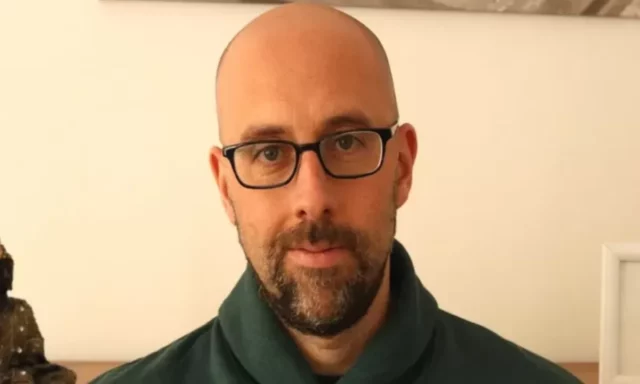Although it may seem like a contradiction, some psychologists who are fed up with what they refer to as the “happiness industry” say that it is okay to feel bad in order to feel good. The Spanish psychologist, David Salinas, challenges ideas such as “if I am sad, it turns out that I am a wretch. If I fail, it turns out that I am a loser”.
It was in one of those dark moments when things didn’t seem to be going well at all, when the Spanish psychologist, David Salinas, thought that he was tired of the social imposition of always having to be well, especially when much of his work is related to with the well-being of people. And from there came the idea of writing the book “The dictatorship of happiness”, which led him to say: “I am unhappy… and I am glad!”. At first sight, one might dismiss out of hand reading a book that defends the thesis that it is good to be “glad to be unhappy”, or to be glad to have a miserable life.
Clearly, the author warns, the book is not about that. What he criticizes is the “imposition” of having to “be happy” at any cost, in the context of a growing industry of happiness that has been promoted through an avalanche of self-help books with recipes to achieve that assumption of permanent wellness. He is fed up with having to “be happy”, a mental construction that, in his opinion, is false, given that happiness is not a goal to be achieved, but rather, a non-permanent state.
Salinas, who is 42 years old, reviews in this interview what his experience has been working in his practice in Malaga, Spain, and addresses the main myths about the idea of being happy. And yes, he believes that by displacing these myths, it is possible to enjoy life more:
You are a professional who works in the field of cognitive-behavioral therapy. Why did you take that path and not choose another of the schools that exist within psychology to treat your patients?
Because it is a type of therapy that focuses more on the past, just as psychoanalysis does. I try to be eclectic and I find that what other schools of therapy are doing is also very valuable. But sometimes people come to therapy looking for resources, solutions, help through tools that allow them to better face day to day.
With this therapeutic approach he has also written his book, “The Dictatorship of Happiness”. But what is that dictatorship? Each one can understand the dictatorship of happiness as a different thing. I understand it as a social, cultural imposition, through which it seems that you always have to be well and that people are not allowed to be bad.
And that is not all; it is not just that you always have to be well, but that you always have to be looking for happiness, and along with that, you always have to be looking for a stimulus that gives us happiness. So people feel somehow stressed, and paradoxically, when a person feels pressured, they do not feel happy. It seems that we live in a world where feeling bad is not allowed. If you feel bad, it seems that you have failed as an individual.
But if we look at it from another side, there is a constant need for people to feel better, as an almost universal human aspiration, that is, it does not only respond to an external imposition. In fact, before doing this interview, a colleague told me: Oh no, another author is going to tell me that it is okay to be unhappy, enough is enough, I do want to be happy!
Yes, I have received criticism like that, but mostly the opposite has happened to me. People who say, “Stop telling me what to do to feel happy”. We live in a tiredness of positive messages, of literature that tells you what to do to feel happy. And what has been achieved with this is that people put too much focus on themselves and on the search for their well-being.

But when you focus on yourself, you are also realizing your shortcomings, your limitations, your complexes, your traumas, and we cannot be perfect. It is normal to have all of that. Of course I also want to be happy, but I want to be happy from the awareness that I am not going to achieve absolute happiness, nor a happiness that is permanent because that does not exist. They have sold us the message that you follow a certain life script, if you follow my advice, you will achieve happiness that will be eternal.
You say that this idea of happiness is imposed on us. Who imposes it on us?
Happiness has become a business. Books, conferences, congresses, that see happiness as a business. And I think it is not all bad that this happens because just as other less important things are sold, why not sell happiness? The point is that you do not have to fool people. You do not have to sell people an idealistic life model that is unreal. You can tell people that it is okay to do things to feel good and to learn to grow personally, but not everything is based on happiness.
I am convinced that to be happy, we have to learn to be unhappy. We have to learn to move in the swamps of unhappiness. Not everything is beautiful or so simple, but nothing happens. If you allow yourself to be bad, if you allow yourself frustration, if you allow yourself uncertainty, you will be able to go through those swamps of unhappiness and reach states of happiness. It is that happiness is that, it is a state.
You say that there are times when you are happy to be unhappy. That phrase might seem like a contradiction…
That came to my mind at a time of crisis in my life, because psychologists also have our crises like everyone else, at a time when I was not having a good time. It was at that moment when I thought: I am unhappy… and I am glad!, and the truth is that I felt very good, because what he was really telling me is that my state of mind does not build my identity.
We tend to build our identity based on the things that happen to us and how they make us feel. So, if I am sad, it turns out that I’m a wretch. If I fail, it turns out I am a loser. That is totally harmful. I can fail and that does not mean I am a failure and of course I can feel bad, and it does not mean I am miserable. They are simply moments or stages of life and we can go through them.
For me, happiness is a state and, as a state, it is transitory. It is a subjective state of mind in which the person feels more or less happy according to the evaluation that he is making of her life for her at that moment. That is why happiness is not something immutable and it is important to keep that in mind. That I feel unhappy in a specific moment does not make me miserable. It makes me a human and as a human I also feel unhappiness.
But at the end of the day, patients come to your office looking for well-being, looking to feel happier, what do you do in your office?
It depends on each case. I work mainly with anxiety and depression problems, but well, there are people who come to me because they feel bad and want to feel better. One of the mantras that works best for me with my patients is that one which allow themselves to be wrong.
Sometimes we have stress problems and we become afraid of fear, we do not allow ourselves to feel emotions. Being nervous, for example, is normal, because you have to face challenges in your daily life and you get nervous. The same thing happens with sadness, we get very angry at sadness, as if feeling sad were something for depressed people, when it is something human.

But when people accept that they have the right to feel bad and that feeling bad is human, it is not necessarily pathologic. What kind of resources do you use to make them feel better?
It depends a lot on the person, it is very important, for example, the issue of being active, exercising, moving, because sometimes we get too much inside the mind and we have to go outside, realize that we also have a body and that it is very important to move the body because of the impact it has on the nervous system.
The other thing is socializing, talking, being with other people, it is also very important. And depending on the case, I also teach relaxation techniques, mindfulness, to pay full attention to the present moment. And just as it is important to leave space to feel bad, it is also important to generate emotions such as joy and seek resources that help us feel happier.
I also try to help people feel happier, but I do it from the perspective of asking what can help you feel better and what you can do to deal with what makes you feel worse. To talk about happiness, we must also talk about unhappiness; that is, what do we do with the dark side of life.
I think that by giving so much importance to happiness, by putting happiness on an altar, we are generating a lot of frustration and a lot of guilt. I tell my patients to get rid of the idea that happiness is a goal to be achieved, because it does not work that way.


